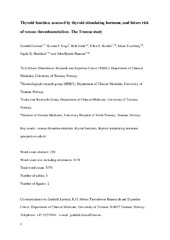| dc.contributor.author | Lerstad, Gunhild | |
| dc.contributor.author | Enga, Kristin Fjeldstad | |
| dc.contributor.author | Jorde, Rolf | |
| dc.contributor.author | Brodin, Ellen Elisabeth | |
| dc.contributor.author | Svartberg, Johan | |
| dc.contributor.author | Brækkan, Sigrid Kufaas | |
| dc.contributor.author | Hansen, John-Bjarne | |
| dc.date.accessioned | 2016-03-21T08:54:10Z | |
| dc.date.available | 2016-03-21T08:54:10Z | |
| dc.date.issued | 2015-04-21 | |
| dc.description.abstract | Objective: The relationship between thyroid function and the risk of venous thromboembolism (VTE) has not been addressed in population-based cohorts. We investigated the association between TSH levels and the risk of VTE in a general adult population.
Design: Population-based cohort study.
Methods: TSH was measured in 11 962 subjects aged 25–89 years who participated in Tromsø 4–6 starting in 1994–1995. Incident VTE events were recorded through 31st December 2010. Cox's regression models with TSH as a time-varying covariate were used to calculate hazard ratios (HRs) of VTE by TSH categories (low TSH: <0.05 mU/l; moderately reduced TSH: 0.05–0.19 mU/l; normal TSH: 0.20–4.00 mU/l; moderately elevated TSH: 4.01–5.00 mU/l; and high TSH: >5.00 mU/l) and within the normal range of TSH, modeling TSH as a continuous variable.
Results: There were 289 VTEs during 8.2 years of median follow-up. Subjects with low (prevalence: 0.22%) and high (3.01%) TSH had slightly higher risk estimates for VTE than did subjects with normal TSH (multivariable HRs: 2.16, 95% CI 0.69–6.76 and 1.55, 95% CI 0.87–2.77 respectively), but the CIs were wide. Moreover, there was no association between TSH within the normal range and VTE (HR per 1 mU/l increase: 0.95, 95% CI 0.82–1.11).
Conclusion: Serum levels of TSH within the normal range were not associated with a risk of VTE, whereas low and high TSH levels were rare and associated with a moderately higher risk of VTE. The present findings suggest that only a minor proportion of the VTE risk in the population can be attributed to thyroid dysfunction. | en_US |
| dc.description | Accepted manuscript version. Published version at <a href=http://doi.org/10.1530/EJE-15-0185>http://doi.org/10.1530/EJE-15-0185</a>. | en_US |
| dc.identifier.citation | European Journal of Endocrinology 2015, 173(1):83-90 | en_US |
| dc.identifier.cristinID | FRIDAID 1259943 | |
| dc.identifier.doi | 10.1530/EJE-15-0185 | |
| dc.identifier.issn | 1479-683X | |
| dc.identifier.uri | https://hdl.handle.net/10037/9042 | |
| dc.identifier.urn | URN:NBN:no-uit_munin_8612 | |
| dc.language.iso | eng | en_US |
| dc.publisher | European Society of Endocrinology | en_US |
| dc.rights.accessRights | openAccess | |
| dc.subject | VDP::Medisinske Fag: 700::Klinisk medisinske fag: 750::Endokrinologi: 774 | en_US |
| dc.title | Thyroid function, as assessed by TSH, and future risk of venous thromboembolism: The Tromsø study | en_US |
| dc.type | Journal article | en_US |
| dc.type | Tidsskriftartikkel | en_US |
| dc.type | Peer reviewed | en_US |


 English
English norsk
norsk